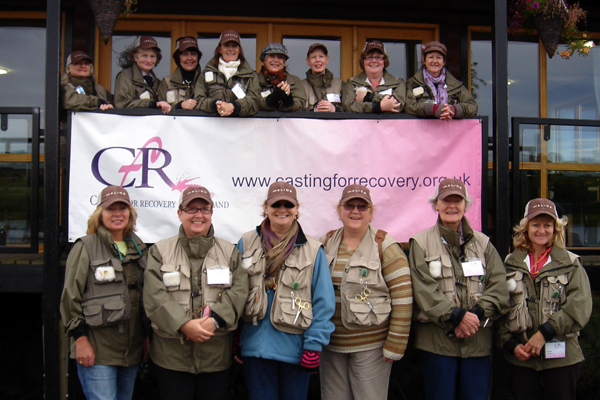
CASTING FOR RECOVERY, the UK charity which provides free weekend angling retreats for women recuperating from breast cancer, hosted its first event in Scotland yesterday.
It was an all-round success, both for the particpants and for those who helped to make it happen.
The venue was Forbes of Kingennie, the Angus country resort just outside Dundee, owned by former Scottish champion fly-fisher Mike Forbes and his wife Gail.

Fourteen women from Scotland and the north of England were offered places on the retreat which provides two tailor-made days of rest, relaxation and instruction in fly-fishing as a unique therapy for helping to cope with the trauma of cancer and its treatment.
I first wrote about CfR 18 months ago when the organisation, which is funded by the Countryside Alliance, was just starting to make its presence felt in the UK. It seemed such an inspiring and sound initiative: that women – the majority of whom have never held a fishing rod in their lives – should benefit both physically and emotionally from the pastoral pleasures of angling.
At the time I volunteered to help the team whenever they brought the event to Scotland.
So it was that yesterday I found myself in the company of 13 other guides, some professional ghillies and instructors, others like myself who were simply volunteering to put some of their knowledge and skills into a worthwhile cause.
The women – age ranges from early 40s to 60s – all recuperating from breast cancer, and all with differing medical profiles, had gathered on Friday afternoon and had spent Saturday being tutored on many aspects of the basics of fly-fishing, from knots and fly-tying, to entomology and the rudiments of casting.
By Sunday morning cameraderie was well-established, humour was in plentiful supply and, fully kitted out by Orvis with light rods, reels and fishing vests stuffed full of key gadgets, they were all itching to catch their first trout.

The guides, it’s safe to say, were more than a little nervous. CfR’s written instructions and rules for behaviour ran to six closely-typed pages, including what to wear and what not to drink i.e. anything alcoholic.
I was partnered with Barbara from Edinburgh, a charming and out-going Irish girl who’d had a double mastectomy four years ago, but who was now undergoing treatment for the cancer in her bones. A daunting burden for anyone to carry.
Her enthusiasm for the challenges of angling, and positive approach to life in general, made a staggering contrast with the majority of misery voices that we all regularly encounter, those who seem to think life owes them a living.
A spirit of competition quickly emerged on the bankside of Kingennie’s lower pool – thoughtfully closed to the public for the day – as we all tackled up and set to work with our companions; there was clearly going to be some kudos for the first fish landed.
It was not to be us. And apart from two quick ‘knocks’, Barbara and I failed to connect with a fish all morning. The blame was mine.
Some of the other guides, like Carnoustie’s Colin Elder – a former Scottish international and participant in Friday’s Champion of Champions competition on the Lake of Menteith – were more successful landing three beautifully-conditioned rainbows for his partner.
Barbara showed a natural ability for rod and line, quickly mastering all the basics, including false casting, and displaying grit and determination to improve on that all-important timing of hand, arm and eye. She’ll have her first fish before long.
But fish or no fish, the girls were universally hooked and many were keen to pursue the sport next season peppering the guides with questions about venues, tackle and conditions.

By the time it came to lunch, speeches and farewells, more than one guide admitted he had found the whole experience unexpectedly emotional. It was that sort of day.
CfR UK co-ordinator Sue Hunter confessed to being overwhelmed by the support and generosity of the Forbes family and by the facilities they provided. She was confident the event would return to Angus next year given continuity of funding.
CfR will deliver seven retreats in the UK this year and it now has a pool of 85 guides. But each event requires up to 35 support volunteers and costs around £5,500 to stage. The Scottish Countryside Alliance provided funding for the Kingennie retreat.
A clearly-delighted Hunter said yesterday: “Currently we deliver retreats to between 40 and 50% of applicants, but we are aiming to restructure CfR to make it available to many more women.
“Once that is done we will be launching a newsletter to spread the word.”
Driving home yesterday afternoon and reflecting on the day it occurred to me that while fly-fishing seems particularly suited to breast cancer sufferers, partly because of the mechanics of casting and partly from the psychology of it all, women are not the only gender to suffer the disease.
Could the format work with a reversal of roles – women providing the guiding to male learners?
Sure there is a nationwide dearth of women in angling, but given the skills and enthusiasm of some of yesterday’s new female recruits it might be an approach worth considering not only to foster their on-going interest in the sport, but to impart some of their astonishing vitality and refreshing zest for life.
These women have a lot to teach us all.